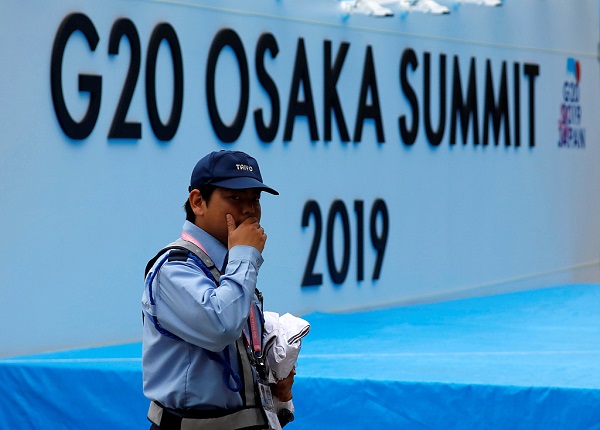China on Thursday blasted US President Donald Trump's threat of additional tariffs on Chinese goods just days before a widely anticipated meeting between the leaders of the two countries at the G20 in Japan, striking a defiant tone over the US' bullying tactics and asserting that it is not afraid of "evil and pressure."

A security officer walks past at the venue of G20 leaders summit in Osaka, western Japan June 26, 2019. (File Photo: VCG)
Some Chinese analysts warned that the US move and disagreements in the ongoing preparatory talks could disrupt plans for the meeting between President Xi Jinping and Trump and further trade talks.
With the whole world watching closely, the two leaders are scheduled to meet on Saturday on the sidelines of the G20 summit in Osaka in Japan, which takes place from Friday to Saturday. The leaders agreed to meet during a phone call at the request of the US side. Some Chinese analysts are not optimistic about the outcome of the meeting given the widening divisions between the two countries, particularly after the US' latest threats.
"There is a possibility that the two leaders walk away without reaching any breakthrough," said Song Guoyou, director of Fudan University's Center for Economic Diplomacy, noting that the US' threat darkens the prospect for the meeting and further trade talks.
'Not afraid of evil'
"Chinese people are not afraid of any evil or any pressure. We would never buy this," Geng Shuang, a spokesperson for the Chinese Foreign Ministry, said during a routine press briefing on Thursday, referring to the latest threats from US officials.
In an interview with Fox Business Network on Wednesday, Trump threatened that he was ready to impose tariffs on $300 billion worth of Chinese products, if China does not agree to a trade deal.
"My plan B is that if we don't make a deal, I will tariff and maybe not at 25 percent, but maybe at 10 percent, but I will tariff the rest of the $600 billion that we're talking about," Trump said, adding that the US might do "less and less business with China."
In the wide-ranging interview, Trump aggressively defended his tariffs in face of growing opposition from US consumers and businesses and repeated false claims, arguing that the US is collecting billions from tariffs and that China wants to sign a deal more than the US. He alleged that the Chinese economy "is going down the tubes."
But Chinese analysts pointed out that it is Trump who wants a deal badly because the US economy is hurting. "Trump is already feeling the pain, that's why he wanted to talk with China," said Liang Haiming, dean of the Belt and Road Institute at Hainan University, who follows the China-US trade talks closely.
At a press briefing on Thursday, Gao Feng, a spokesperson for the Chinese Ministry of Commerce, said that 96 percent of US business representatives testified against the US proposed tariffs in ongoing hearings and they could cause a loss of $1 trillion for the US economy.
In China, where anti-US sentiment and patriotism are running high, officials have mounted a fierce response to what many in China believe to be an ill-intended attempt by the US to contain China's economic and technological rise. Whole-of-society efforts are underway to prepare for a protracted trade war with the US.
"For China, the worst-case scenario has already been predicated and it will not get any worse," Liang said, noting that the Chinese economy is resilient enough to withstand the pressure.
Weakened US position
Apart from the US economy, the US decision to wage a trade war with almost all major economies has weakened its position in trade negotiations with China, particularly at the G20, where multilateralism and economic globalization is still the main theme, Chinese analysts said.
In the interview with Fox Business, Trump did not just take aim at China, but lashed out at "almost all countries in this world" that he claims to have taken "tremendous advantage" of the US. Close allies in Europe and Asia were not spared Trump's litany of complaints.
"I don't think the world can take this from [Trump] anymore," Liang said, adding that with the US entering presidential election cycle, "time is on China's side." Unless the US makes big concessions, China is not backing down from its stated bottom lines, he added.
Chinese officials have also publicly drawn their bottom lines in the trade talks: all tariffs must be removed, demands for Chinese purchase of US goods must be reasonable and the text of the trade agreement must respect China's dignity and sovereignty.
China is also reportedly planning to ask US officials to lift the ban on Chinese telecom firm Huawei as part of any potential trade deal.


